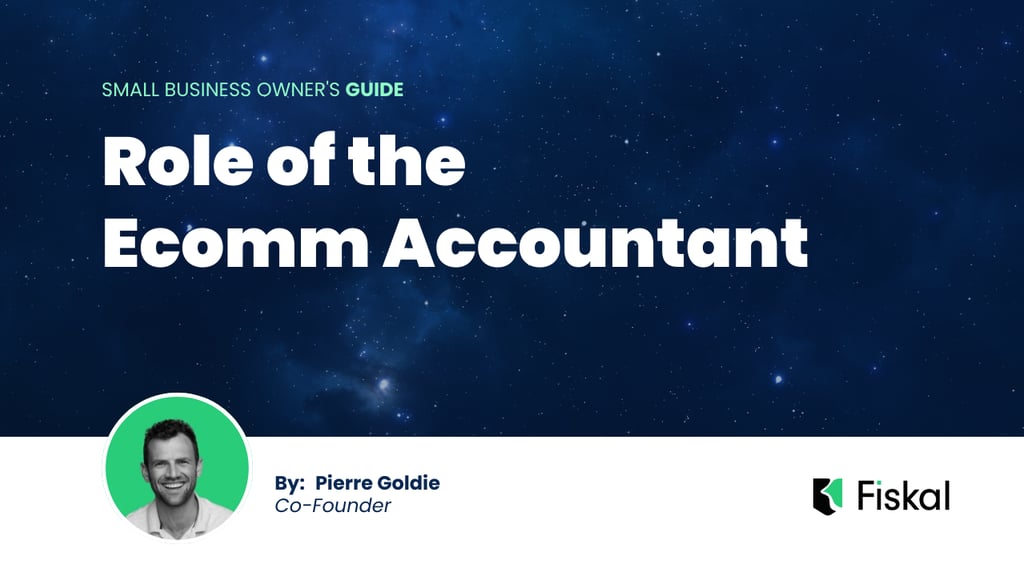Role of the Ecomm Accountant
In 2025, the ecommerce landscape is booming, with online sales reaching new heights. However, this growth brings unique financial challenges that can overwhelm business owners. Hiring an ecommerce accountant is not just a smart move—it’s essential for navigating these complexities and ensuring long-term success. This overview explores why ecommerce businesses need specialized financial help, the roles of different professionals, when to seek assistance, and the benefits of partnering with an expert.
SYSTEMS AND SOFTWAREECOMMERCE


Role of the Ecomm Accountant
Introduction and Context
As of March 21, 2025, the ecommerce sector is experiencing unprecedented growth, with online sales projected to reach significant milestones. This surge, however, introduces complex financial challenges that necessitate specialized expertise. Research from various sources, including A2X Accounting: Where to Find an Ecommerce Accountant, suggests that hiring an ecommerce accountant is crucial for online businesses to navigate these complexities effectively. This survey note provides a detailed examination of the necessity, roles, indicators, and benefits of hiring such professionals, drawing from recent industry insights and best practices.
Unique Financial Challenges in Ecommerce
Ecommerce businesses operate in a financial landscape distinct from traditional retail, facing several unique challenges:
Multi-Channel Sales: Managing transactions across platforms like Shopify, Amazon, and social media involves diverse fees, refunds, and payment systems. For instance, Ecommerce Accounting 101 + Best Practices | BigCommerce highlights the need for tracking these transactions to maintain financial accuracy.
Complex Inventory Systems: Balancing stock across channels while accurately calculating COGS and handling returns is critical. With return rates reaching up to 30% in some sectors, as noted in Ecommerce Inventory Management: A Complete Guide for 2025, inventory management becomes a significant challenge.
Diverse Tax Jurisdictions: Online businesses must navigate tax laws across states, countries, and international borders, ensuring compliance with sales tax, VAT, and other regulations. How to Find an Ecommerce Accountant emphasizes the importance of understanding these obligations, especially with expanding operations.
Cash Flow Management: Rapid growth can strain cash flow, requiring precise forecasting and inventory management to avoid overstocking or stockouts. How an Ecommerce Accountant Boosts Your Business Growth notes that effective cash flow management is vital for sustainability.
Accounting Software Integration: Many ecommerce businesses struggle with integrating platforms like QuickBooks or Xero with their sales channels, leading to inefficiencies. A Detailed Guide to eCommerce Accounting | Bean Ninjas recommends using automated tools to streamline this process.
These challenges underscore the limitations of general accounting services, which may not address the specific needs of ecommerce businesses, particularly in 2025’s competitive environment.
Roles of Financial Professionals: CPAs, Accountants, and Bookkeepers
To clarify the roles of different financial professionals, consider the following breakdown, informed by sources like CPA vs. Bookkeeper: Know the Differences and Which is Better | Miami Herald and Accountants vs. Bookkeepers: What's the Difference? | Business.com:
Bookkeepers: Focus on day-to-day financial recording, such as tracking sales, expenses, and reconciling bank statements. They ensure accurate transaction records but do not typically provide strategic analysis. For example, they might record purchases and sales, as noted in The Differences Between Bookkeepers vs. Accountants vs. CPAs | Chron.com.
Accountants: Offer deeper financial analysis, including preparing financial statements, analyzing performance, and advising on profitability. In ecommerce, they specialize in understanding platform-specific financials and compliance, as seen in How to Find an eCommerce Accountant? | LinkMyBooks.
CPAs (Certified Public Accountants): Licensed professionals with advanced expertise in tax law, audits, and financial planning. For ecommerce, CPAs are invaluable for handling multi-jurisdictional tax compliance and preparing for audits or investment, as highlighted in Bookkeeper vs. Accountant vs. CPA: How Are They Different? | Indeed.com.
The distinction is crucial: while bookkeepers handle the basics, accountants and CPAs provide the strategic oversight necessary for ecommerce businesses to thrive, with CPAs offering the most comprehensive services for complex needs.
Key Indicators for Needing Specialized Financial Assistance
Several indicators suggest when an ecommerce business should seek specialized financial help, as detailed in sources like When to hire an eCommerce accountant | Expandly Xero and Read This Before You Hire an Ecommerce Accountant | Dropshipping.com:
Expanding Sales Platforms: Selling on multiple channels increases transaction complexity, requiring unified financial management. For instance, How to hire and vet an ecommerce accountant | Bean Ninjas notes this as a common trigger.
Seeking Funding or Investment: Accurate financial statements are essential for attracting investors or securing loans, which general accountants may not fully optimize for ecommerce, as per When is it time to hire an e-commerce accountant? | 5 Minute Bookkeeping.
Struggling with Accounting Software: Difficulty integrating or using tools like QuickBooks, Xero, or A2X suggests the need for professional setup and management, as mentioned in A2X Accounting: Where to Find an Ecommerce Accountant.
Tax Compliance Issues: Expanding into new states or countries introduces complex tax obligations that require specialized knowledge, a point emphasized in Why You Need an Accountant for Ecommerce NOW! | Finotor.
Time Constraints: When financial tasks consume too much time, preventing focus on core business activities, outsourcing becomes critical, as noted in How to Choose an Ecommerce Accountant | Acuity.
Preparation for Scaling: As businesses grow, the need for strategic financial planning, cash flow forecasting, and inventory management becomes paramount, according to Ecommerce Accounting Services for Startups | Graphite Financial.
These indicators signal that the business has outgrown basic financial management and requires ecommerce-specific expertise, particularly in 2025’s fast-evolving market.
Benefits of Partnering with an Ecommerce Accountant
Hiring an ecommerce accountant offers numerous advantages, as supported by sources like Pros & Cons of Hiring an E-Commerce Accountant | Amaka and 11 Reasons Why You Should Hire An Accountant For Online Businesses | Legend Financial:
Ensuring Tax Compliance: They navigate the intricate web of sales tax, VAT, and international tax laws, reducing the risk of penalties, as seen in A Detailed Guide to eCommerce Accounting | Bean Ninjas.
Optimizing Financial Operations: Through accurate bookkeeping, COGS calculations, and inventory management, they enhance profitability and reduce costs, as noted in How an Ecommerce Accountant Boosts Your Business Growth.
Supporting Sustainable Growth: They provide strategic planning, cash flow forecasting, and insights to support scaling and long-term success, a benefit highlighted in Ecommerce Accounting 101 + Best Practices | BigCommerce.
Saving Time and Reducing Stress: By handling complex financial tasks, they allow business owners to focus on growth and innovation, as mentioned in How to Find an eCommerce Accountant? | LinkMyBooks.
Avoiding Costly Mistakes: Their expertise prevents errors in financial reporting, tax filings, and compliance that could lead to legal or financial repercussions, according to 5 reasons your e-commerce business needs an accountant | Sage Advice UK.
Facilitating Funding and Investment: They prepare polished financial statements that are attractive to investors and lenders, as noted in Why You Need an Accountant for Ecommerce NOW! | Finotor.
Enhancing Decision-Making: With data-driven insights, they help identify opportunities for cost reduction, revenue growth, and operational efficiency, a point emphasized in ecommerce accountant: Optimise Your Online Business Finances | Infinity22.
These benefits position the ecommerce accountant as a vital partner for financial health and future success, particularly in 2025’s competitive landscape.
Conclusion
In conclusion, as of March 21, 2025, hiring an ecommerce accountant is essential for online businesses to manage the unique financial challenges of multi-channel sales, complex inventory systems, and diverse tax jurisdictions. The distinct roles of CPAs, accountants, and bookkeepers ensure that businesses can access the right level of expertise, from daily recording to strategic planning. Key indicators, such as expanding sales platforms or seeking funding, signal the need for specialized help, while the benefits—ensuring compliance, optimizing operations, and supporting growth—make this partnership indispensable. By leveraging an ecommerce accountant’s expertise, businesses can navigate the complexities of 2025’s ecommerce boom and achieve sustainable success.












